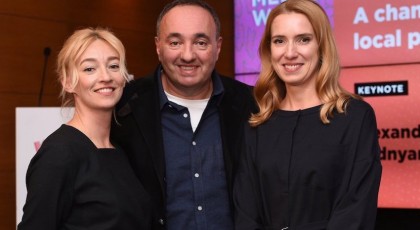
The third day of KYIV MEDIA WEEK was opened by a screening of TV shows from around the world, prepared by Media Resources Management (MRM) together with the TV Channel Ukraine. The event presented novelties, both the ones, which could already be seen on the Web as well as the projects that would premiere this fall. One of the most anticipated premieres is the romantic comedy MODERN LOVE, which explores the theme of love featuring impressive star cast (it will be released on Amazon in October), as well as THE MORNING SHOW – dramedy for Apple TV +, in which Reese Witherspoon and Jennifer Aniston participated not only as leading actors but also as producers.
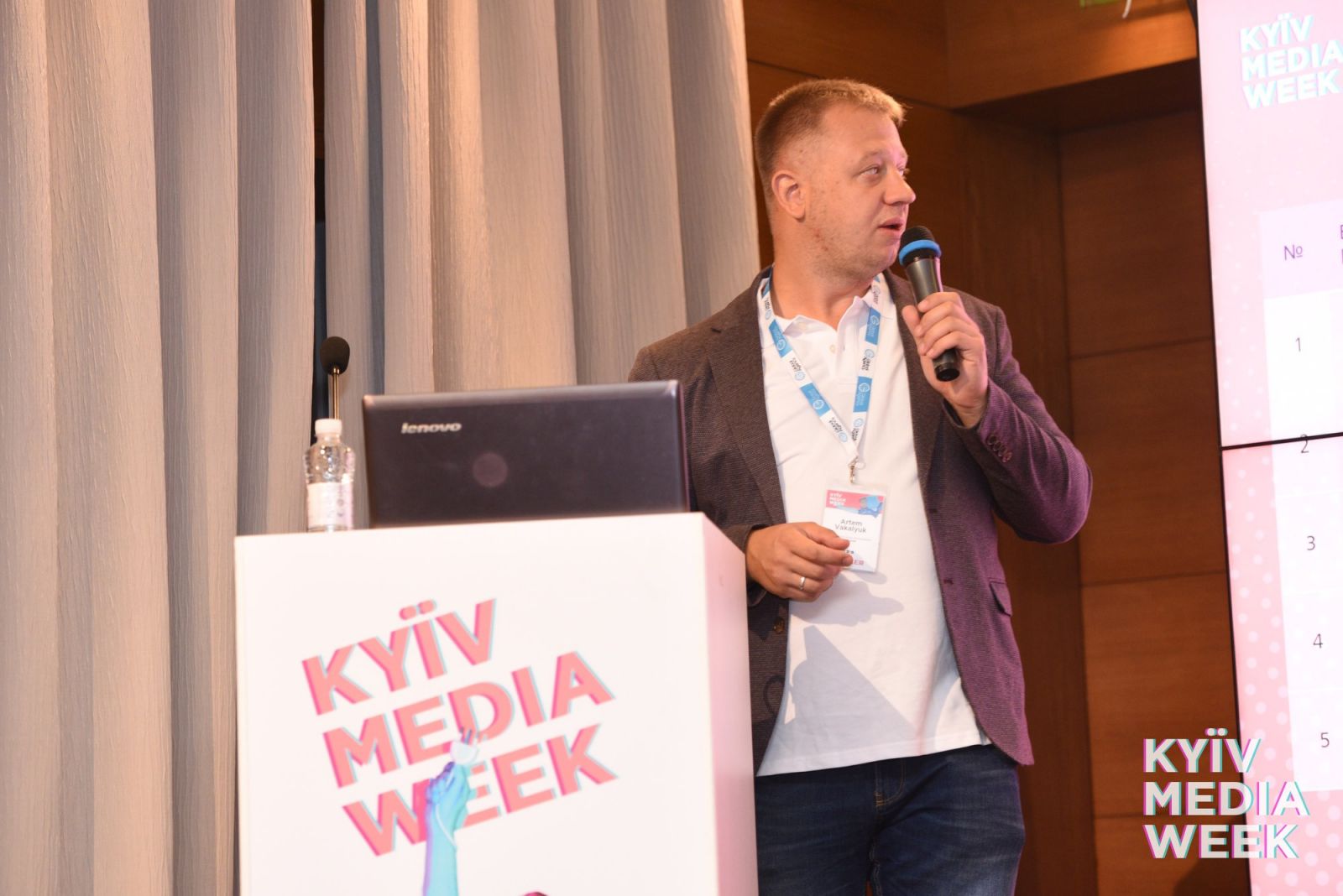 Meanwhile, participants of the section “European box-office. Local hits in top 10" discussed national cinema in Europe. In particular, Artem Vakalyuk, Head of Analytical department of Media Resources Management and MBR, Deputy Editor-in-Chief of MBR, in his speech mentioned: “Ukraine is in the top-10 European countries for cinema attendance, in the top 20 for national cinema and has outpaced such countries as, for example, Slovenia, Slovakia, Romania, Hungary and Bulgaria. But in fact, our country is in the bottom of the Top-20. Therefore, there is a way to move forward,” summed up Artem. As for the three leaders in terms of national cinema share – Turkey has - 62.9%, Great Britain - 44.8% and France - 39.3%. But, notably, UK often serves as a co-production partner when American films are shot on its territory, therefore such films have got the national status. Therefore, the share of 100% British films is significantly lower. In addition, Vakalyuk gave a review of the local hits of European countries national box-office. For example, France and Spain show the sustainable leadership of national films: last year 100 MILLION EURO 3 (Les Tuche 3) was the second in the box office rating, and CHAMPIONS (Campeones) – the fifth. However, even with a significant share of national cinema, American blockbusters often crowd out local hits from their top. A similar situation, is for Italy, where a local film with the largest box office barely entered the Top-10.
Meanwhile, participants of the section “European box-office. Local hits in top 10" discussed national cinema in Europe. In particular, Artem Vakalyuk, Head of Analytical department of Media Resources Management and MBR, Deputy Editor-in-Chief of MBR, in his speech mentioned: “Ukraine is in the top-10 European countries for cinema attendance, in the top 20 for national cinema and has outpaced such countries as, for example, Slovenia, Slovakia, Romania, Hungary and Bulgaria. But in fact, our country is in the bottom of the Top-20. Therefore, there is a way to move forward,” summed up Artem. As for the three leaders in terms of national cinema share – Turkey has - 62.9%, Great Britain - 44.8% and France - 39.3%. But, notably, UK often serves as a co-production partner when American films are shot on its territory, therefore such films have got the national status. Therefore, the share of 100% British films is significantly lower. In addition, Vakalyuk gave a review of the local hits of European countries national box-office. For example, France and Spain show the sustainable leadership of national films: last year 100 MILLION EURO 3 (Les Tuche 3) was the second in the box office rating, and CHAMPIONS (Campeones) – the fifth. However, even with a significant share of national cinema, American blockbusters often crowd out local hits from their top. A similar situation, is for Italy, where a local film with the largest box office barely entered the Top-10.
The leitmotif of the panel discussion “Ukrainian film market: joining forces to generate box-office” can be encrypted in the phrase of its moderator – general producer of Odessa international film festival, co-founder of Ukrainian Film Academy Julia Sinkevych: “It is important to join the efforts of various market players in order to generate the maximum box offices.” She was supported by the producer of FILM.UA Group, Irina Kostyuk, who spoke about the priority of synergic work of producers, distributors, exhibitors and marketers when working on the release to the market. Irina also emphasized on the importance of product placement, calling a product placement in Ukrainian films “a sign of the healthy Ukrainian film.” For example, in the comedy CRAZY WEDDING, four full-fledged product placements were introduced, thereby providing the project with extra funding. Andriy Nogin, General Producer of FinalCutMedia, urged producers to consider the level of maximal box-offices when planning the production budgets. According to him, today the maximum budget for should not exceed $ 400 thousand, but it is better stay within $ 300 thousand. Actually, both 2 series of Ukrainian – produced film SWINGERS were created within such budgets (the budget of the first part was about $ 200 thousand, and of the second - approximately $ 250-260 thousand). “In order to pay off at the box office, we must stay within $ 400-450 thousand budget,” added Iryna Kostyuk. Roman Martynenko, CEO of Multi Media Distribution, noted that Ukrainian cinema is not a direct competitor to Hollywood. This is the sphere that needs to be developed, and there is a such opportunity. As an example, he named the general revenues of Ukrainian cinemas for the weekend. Last year, the highest revenues were the weekends when Ukrainian films were released CRAZY WEDDING and THE STOLEN PRINCESS, and, by the way, powerful Hollywood releases has also appeared within these days. Vitaly Pisarenko, CEO of the Multiplex cinema chain, confirmed the words of Martynenko: “Judging by the internal analytics of the largest Ukrainian cinema network, income from the national product does not take away the audience of Hollywood films from, but rather adds it.” Khrystyna Shkabar, Head of the Department of Production of feature (fiction) projects “1 + 1 Production”, noted that this year there were a lot of Ukrainian films on the channel “1 + 1” and they showed good viewing ratings. So, TV distribution is another opportunity for filmmakers to monetize their content. But in order to succeed, film producers and television channels should start coser communication on the projects from the scenario stage of development.
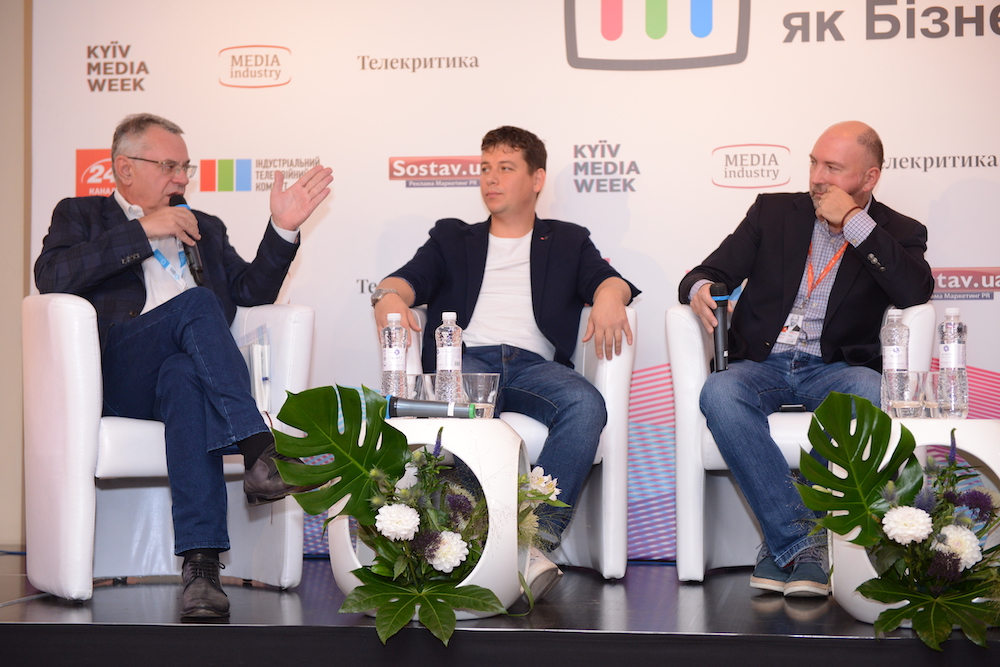
The second part of “Television as a business” conference turned out to be extremely eventful. On its official opening, Yaroslav Pakholchuk (COO, board member of 1+1 media, Director of Pay TV), provided the detailed plan of the satellite signal coding of Ukrainian media groups and recalled that on DTT channels there is an informational pop-up about switching to another type of paid signal. Rolling blackouts will begin in October and, according to estimates, subscribers will switch to other platforms during November-December this year. Now about 4.4 million viewers are using on-air TV, and it is expected that about 2 million will switch to the paid TV. D-Day is on January 20, 2020. As for the TV advertising market, it seems like it is undergoing the process of restoration and returning to the pre-crisis volumes (i.e. 2013-2014). The market is growing in monetary terms, but everything is not so unambiguously - this year showed the decrease of advertising inventory for about 12-20%. The main reason is the presidential and parliamentary elections, which both took a considerable share of advertising inventory in favor of political advertising. Moreover, if the reduction in inventory was expected before the first round, the prospects of second round of the presidential election was not clear and only has made the situation worse. Brands had to scale back their ambitions, while the cost of inventory crawled up. There will be certainly increase in price in 2020, but there will be no elections, and some brands are kept guessing, why a price is so high. Finally, representatives of media groups and FILM.UA discussed the needs for actions due to Netflix and another international OTT-services expansion. Unfortunately, the participants didn’t come to the collective opinion. Besides the speakers could not find the common ground on what is Netflix – a threat or an opportunity – the opinions were quite different. However, as Pakholchuk told, “for the first time in five years, during the discussion, we finally agreed that something should be done”. There are two main options: creating a platform in opposition to Netflix, or selling content to Netflix in order to convert its local version into a platform of both foreign and Ukrainian content. An unlikely the third option is called an alliance of media groups, but in this case, each of them can start, as they say, to pull the blanket on each one’s side, which will not benefit both users and companies.
For the first time ever the Delegation of the European Union to Ukraine became the official partner of the forum. Behind this decision are steakholders' trust, forum reputation and tendency to sharing the best European practices in Ukraine.
One of the top and super relevant events within the third day of KMW was the case study “The Home of Thrones: a case study of the screen industry in Northern Ireland". Speaker Andrew Reid, Head of Production for the national agency Northern Ireland Screen (NI Screen), was presented by Victoria Yarmoshchuk, director of media forum organizer MRM. Speaking about the relevance of Irish experience for Ukraine in the field of coproduction and attraction of foreign content producers, Victoria emphasized on the relevance of such case study especially in the context of current issue of rebates, that arised. NI Screen is the engine of the national content industry of Northern Ireland. During negotiations with HBO on the filming of GAME OF THRONES pilot, it was Andrew Reid and the NI Screen team who convinced HBO to bring production to their region. Thanks to the joint efforts of NI Screen, HBO and Warner Bros. the government to applied a tax-relief and tax credit for high-end TV drama production of television series. As a result, the numbers speak for themselves: in total, NI Screen invested about £ 16 million of public funds in 8 seasons of GAME OF THRONES. And they received about £ 251 million profit to the economy of Northern Ireland through services and tourism. During his speech, Andrew Reid comprehensively revealed all aspects and details of how to make the country attractive for the top foreign content producers. He concluded his speech by a remark: “The main secret of our success? We always did exactly what we promised”.
Meanwhile, communications manager for British company K7 Media, David Ciaramella, presented a selection of the best shows for children and teenagers. Teenagers dream of popularity, future influencers, a ninja nanny, Carmen, 14-year-old Robin Hood, little criminals ... All those are the heroes of new content for a young audience.
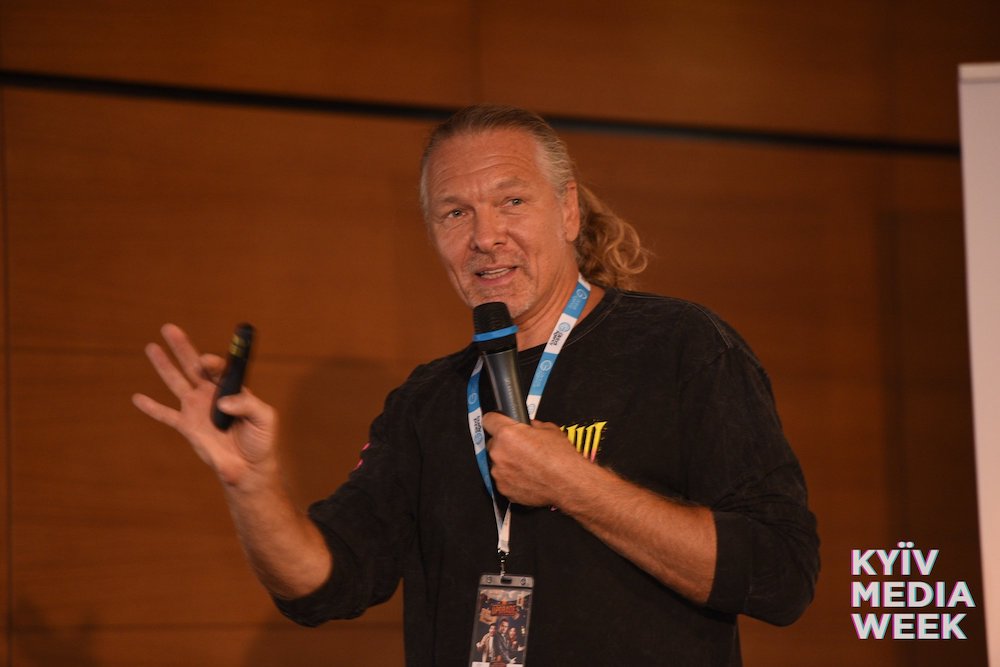 “I am going to scare you,” Sergey Tsyptsyn CEO of CG Event, announced his plans just before his speech. And he didn’t lie, on his report “Matrix. Artificial Intelligence and Visual Content ” demonstrated what artificial intelligence technology is capable of today, how artificial intelligence made this far into the field AV industry and where it might lead us in the nearest future. The main conclusion made by the speaker was that soon humanity will need to regulate the consumption of visual content, since artificial intelligence will be able to influence not only the emotions of the audience, but also put them into certain psychological states. Naturally, there is a great risk that this will happen even without the knowledge of a person, so it’s worth considering now.
“I am going to scare you,” Sergey Tsyptsyn CEO of CG Event, announced his plans just before his speech. And he didn’t lie, on his report “Matrix. Artificial Intelligence and Visual Content ” demonstrated what artificial intelligence technology is capable of today, how artificial intelligence made this far into the field AV industry and where it might lead us in the nearest future. The main conclusion made by the speaker was that soon humanity will need to regulate the consumption of visual content, since artificial intelligence will be able to influence not only the emotions of the audience, but also put them into certain psychological states. Naturally, there is a great risk that this will happen even without the knowledge of a person, so it’s worth considering now.
One of the most anticipated KMW events was a performance by Alexander Rodnyansky. The world known film producer and media manager explained why a production of local content nowadays is the business of the future. For example, a few years ago, America would not have taken up the production of the “Chernobyl” in this form – the main storyline would have to be developed around something more relevant to American style. Now the era of local conent production is returning, and the local product can be distributed worldwide because of the specific national features with even greater success. Among the examples are: the series FAUDA , in which the characters speak Hebrew and Arabic, Italian MY BRILLIANT FRIEND and German DARKNESS. Such system is now used by streaming platforms, which work "at a loss". However, Rodnyansky is absolutely sure that they hold the future.
On the third day of KMW Gavin Reardon Head of Sales and Co-production department, Incendo (Canada) presented a case study of VERSAILLES (2015-2018) series. Having become the biggest co-production project of Incendo in recent years, it was created in together with Canada and France, besides the famous British actors were invited to take up the leading rolest. Reardon emphasized that at a very early stage of the project development, it was decided to film it in English for the sake of international sales. Although the decision was not easy, because the series tells about the life of king Louis XIV of France, called “the national treasure of France”. But the risk paid off: the first season of VERSAILLES became the top-rated series on Canal Plus for the last three years. VERSAILLES is also an international bestseller, which was broadcasted in 140 countries. Reardon emphasized that such large-scale projects are good for co-production, as they allow the producers to receive extra funding from several countries at once. Although preparation, development, implementing, and distributing of such a large-scale co-production project is a difficult task it was totally worth it.
As part of the panel discussion “Ukrainian breakthrough: from CHERNOBYL to China,” the presentation of the most notable achievements of Ukrainian companies, involved in the international projects during the last year was held. The founder of Radioaktive Film, Darko Skulsky, spoke about the participation of Ukrainian team in the production of HBO most regarded series hit (according to IMDB) of this year – CHERNOBYL. In this project Radioaktive Film company participated as a service company provided the producers with 250 Ukrainian professionals. According to Darko Skulsky, one of the main problems associated with filming in Ukraine is the underdeveloped infrastructure with a large selection of locations, however the local market growth can be stimulated by a cash-rebate system with simplified conditions for foreign producers. Kateryna Sheveliuk, Head of monetization department of StarLightMedia, presented the case of the Ukrainian TV series LOVE IN CHAINS – a project created by FILM.UA and StarLight Films. The series was prmiered on STB channel and led it to the top of ratings among all Ukrainian channels (in this particular slot). The filming took place at more than 400 locations, that is why LOVE IN CHAINS is considered to be one of the most ambitious historical costume dramas of the recent years. As for today, the number of viewers of the series has exceeded 22.2 million.
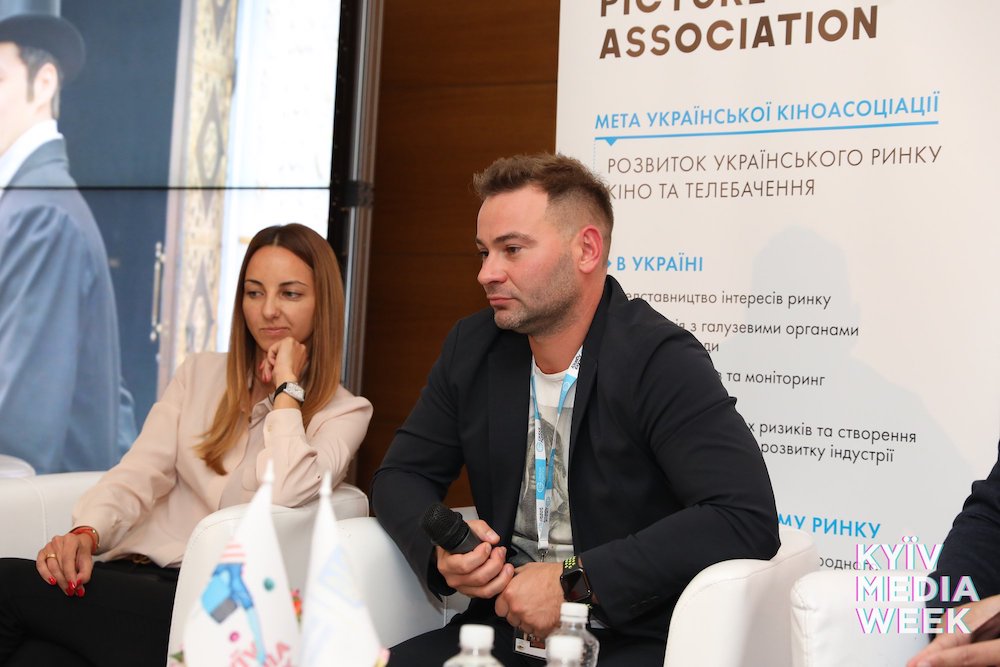 Igor Storchak, CEO of FILM.UA Distribution, noted that the series was a hit not only on Ukrainian television, but also on Polish – due to close cooperation in the region and its premiere on one of the top Polish TV channels TVP1. The filming of the series third season in co-production with Poland is currently under the discussion. CEO of Postmodern Digital, Egor Borschevsky, noted that over the past few years the company has been actively collaborating with Chinese colleagues. One of the most significant projects in the Postmodern Digital portfolio is the CG creation for the Chinese blockbuster WANDERING EARTH. In addition, the company created 15 minutes of CG content for the film LOOKING UP, and actively participated in its supervising in China. Among the main ambitions of the company is the opportunity of full-fledged cooperation with Chinese studios.
Igor Storchak, CEO of FILM.UA Distribution, noted that the series was a hit not only on Ukrainian television, but also on Polish – due to close cooperation in the region and its premiere on one of the top Polish TV channels TVP1. The filming of the series third season in co-production with Poland is currently under the discussion. CEO of Postmodern Digital, Egor Borschevsky, noted that over the past few years the company has been actively collaborating with Chinese colleagues. One of the most significant projects in the Postmodern Digital portfolio is the CG creation for the Chinese blockbuster WANDERING EARTH. In addition, the company created 15 minutes of CG content for the film LOOKING UP, and actively participated in its supervising in China. Among the main ambitions of the company is the opportunity of full-fledged cooperation with Chinese studios.
As part of the panel discussion “Animation in Ukraine: the path to the viewer”,of the Ukrainian Animation Association UANIMA Executive Director Olena Golubieva made a report, where she noted that the animation market volume in Ukraine continues to grow – as of 2018, the indicators exceeded the mark of UAH 148 million (compared to 61 million in 2016). According to Ivanna Nayda, General Producer of niche channels at 1+1 media, who is also in charge of the children's TV channel PLUSPLUS, Ukrainian broadcasters are interested in broadcasting domestic animation content primarily because of existing quotas for a nationally produced content. At the moment, PLUSPLUS does not have the ability to create their own content, so they rely entirely on the Ukrainian producers. Creative Executive Officer at Starlight Digital Vitaly Tchirkov, added that it is necessary to develop not only the production segment, but also the distribution – according to him, Pay-TV is the most successful format for delivering animation, that is why there must be a way to shift from free distribution. An example of popular content for children is Glowberry brand products, which were presented by Olga Cherepanova, Сreative Producer and Co-founder of the company, which became the part of FILM.UA Group in 2016. In addition to books and multimedia projects, in the studio’s portfolio there are also animated series: MOM HURRIES HOME and BRAVE HARES. Michael Margulis, Producer, Founder of KAPI animation studio, presented the studio’s projects? Namely the sequel of animation film about the boy Petryk Pyatochkin.
For the first time ever the Delegation of the European Union to Ukraine became the oficcial partner of KMW. Behind this decision are steakholders' trust, forum reputation and tendency to sharing the best European practicies in Ukraine.
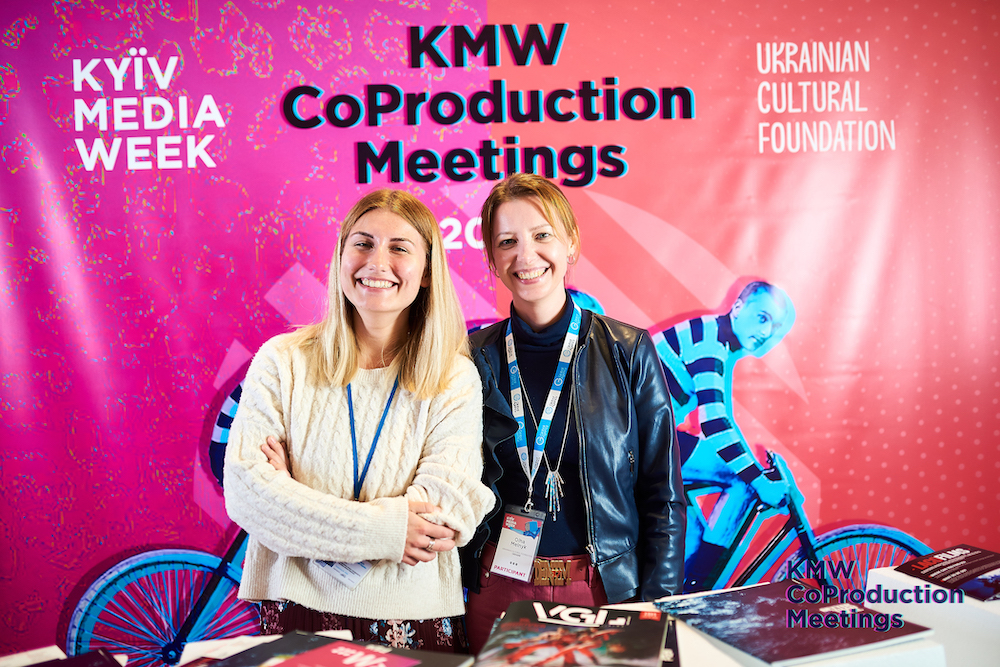 At the end of the third day, KMW hosted the first part of the CoProduction Meetings – forum for reinforcement of international co-production, where producers presented their successful co-production projects, as well as projects under development. When asked what could be the main reason for signing the new agreement, the speakers named the fundamental importance of the story. If the story seems appropriate to them and they truly believe in its success it is the best starting point of collaboration. Gavin Reardon from Incendo (Canada) mentioned the previous experiences of potential partnership in co-production, and accentuated on the personal acquaintance before the project start. He also insisted on the preliminary budget estimates and the full understanding of all financial benefits of cooperation. Gal Zaid, director of drama department at Endemol Shine Group (Israel) focused on the importance of co-production goal: if it is blurred, there is a threat to lose the target audience in both co-producing countries. The producer of Agitprop (Bulgaria) Martichka Bozhilova said that she carefully selects partners for co-production and believes that it is as important as marriage. Initially, she drew attention to the quality of the project and the talent of the person who represents it. If everything is okay with that, and the project truly represents some specific value, then Martychka is ready to put up with the national specifics of work in the partner country. Anders Tangen, CEO of Viafilm (Norway), is interested in what can be shot in Scandinavia. He considers the most important and challenging thing in co-production is to believe in project and to get the certain level of enthusiasm that can later convince the broadcasters and distributors to buy the show.
At the end of the third day, KMW hosted the first part of the CoProduction Meetings – forum for reinforcement of international co-production, where producers presented their successful co-production projects, as well as projects under development. When asked what could be the main reason for signing the new agreement, the speakers named the fundamental importance of the story. If the story seems appropriate to them and they truly believe in its success it is the best starting point of collaboration. Gavin Reardon from Incendo (Canada) mentioned the previous experiences of potential partnership in co-production, and accentuated on the personal acquaintance before the project start. He also insisted on the preliminary budget estimates and the full understanding of all financial benefits of cooperation. Gal Zaid, director of drama department at Endemol Shine Group (Israel) focused on the importance of co-production goal: if it is blurred, there is a threat to lose the target audience in both co-producing countries. The producer of Agitprop (Bulgaria) Martichka Bozhilova said that she carefully selects partners for co-production and believes that it is as important as marriage. Initially, she drew attention to the quality of the project and the talent of the person who represents it. If everything is okay with that, and the project truly represents some specific value, then Martychka is ready to put up with the national specifics of work in the partner country. Anders Tangen, CEO of Viafilm (Norway), is interested in what can be shot in Scandinavia. He considers the most important and challenging thing in co-production is to believe in project and to get the certain level of enthusiasm that can later convince the broadcasters and distributors to buy the show.
This could only be done after you are 100% sure that the project is really worthwhile. Rastislav Sestak, a member of the Slovak Film and Television Academy, co-owner and producer of DNA Production, who came to the forum for the second time, noted that “now the doors for cooperation seem to be opened.”
Today, the participants of the CoProduction Meetings forum, which is supported by Ukrainian Cultural Foundation (UCF), have a day of individual meetings. Their goal is to find partners for international co-production and negotiate with producers whom the guests of the event met at KYIV MEDIA WEEK.